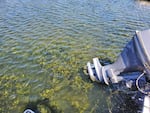
Canadian pondweed has exploded in growth at Lincoln City's Devil's Lake. This invasive weed has led to damages to the ecology of the lake, as well as disrupting recreational activities that are popular in the area.
Courtesy of Joshua Brainerd
A fast-growing weed is taking over Devil’s Lake in Lincoln City.
The invasive Canadian pondweed has been threatening native plants as well as harming recreation by clogging up motorboat engines that recreate in the freshwater lake.
Joshua Brainerd is the executive director of the Devil’s Lake Water Improvement District. He says there has been an explosion since this weed reappeared in recent years.
“We had little to no vegetation less than three years ago,” he said. “Within two years, we went from what would likely be 2% to 3% vegetative cover, at best, to 85% or more.”
This isn’t the first time the lake has battled this weed before. About 40 years ago, the same weed ravaged the waters and ultimately led to the creation of the district, as well as the introduction of 32,000 sterile, grass-eating carp which eventually died off due to age and predation from sea lions.
Brainerd thinks several factors contributed to the weed’s recent proliferation, including warming water temperatures and increasing levels of nutrients in the lake for the weed to grow.
“Devil’s Lake had the unfortunately perfect growing conditions for this plant and with the lack of competition and the speed at which it propagated itself, it’s been very difficult to keep up,” he said.
New rules recently approved by the Oregon Department of Fish and Wildlife will allow the district to reintroduce sterile grass-eating carp into the lake, although under more controlled conditions. The district will be required by the agency to tag each individual carp to track its health and movement in the lake.
On average, each carp can eat two pounds of vegetation a day. But that’s just a tiny fraction of the rapidly growing weeds in the lake.
“The biomass we’ve seen grow in Devil’s Lake, hundreds of thousands of tons of vegetation, is sprouting up every day and dying and moving around right now,” Brainerd said.
Devil’s Lake will be leasing an aquatic vegetation harvester to aid the carp. Brainerd said that herbicides the district tested proved to be ineffective at removing the weeds.
Mechanical harvesting of the vegetation and the reintroduction of the carp are part of a multiyear strategy to eradicate the water weeds which have taken a toll on the local economy, and Devil’s Lake State Recreation Area as a destination for anglers, kayakers and other water sport enthusiasts.
“This past year, many people just did not come back. They decided against recreating on the lake,” Brainerd said.
Joshua Brainerd joined “Think Out Loud” to discuss Devil’s Lake and the fast-growing weed. You can listen to the full conversation here:
